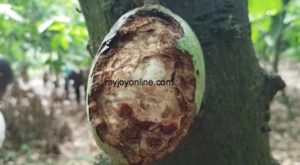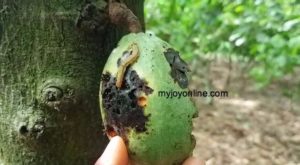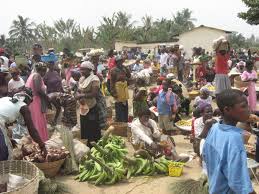We will stop further spread of armyworms – Agric Minister assures

Food and Agriculture Minister Dr. Akoto Owusu Afriyie is assuring that government is committed to stopping further spread of the Fall Armyworm Pests on farms across the country.
The minister says a National Taskforce for the Control and Management of the invasion that has been established will work assiduously to stop any more destruction by the pests.
“We want to remove this permanently and so all the measures that are required to ensure this does not occur again after this control, we are putting in place,” Dr. Afriyie said.
“…. We have to take very sharp remedial action in order to stop the spread and also eliminate the incidence from our fields,” he added.
The African continent has been hit by the invasion of Fall Armyworms which originate from the Americas. Until last year, it had never been seen on the African continent before. But so far, a number of African countries including Nigeria, Zambia, Zimbabwe, Kenya among others have seen the pests invade farms.
According to the Agric ministry, last year, the Fall Armyworm pests destroyed 4,500 hectares of farmlands in Ghana. Since March this year, the pests have destroyed more than 1370 hectares of maize, cowpea and cocoa farms. The Brong Ahafo, Ashanti and Western Regions are the most affected areas.
Dr. Akoto Afriyie says the issue is being treated as an emergency and he has informed the cabinet and the office of the president about the need for immediate release of funds to deal with the problem.
The ministry says it will need GHS16 million to fight the outbreak, half of which will go into the purchase of chemicals and the remaining GHS8 million on education.
Even before the money is released, the Minister says the Chemical Dealers Association of Ghana has agreed to release chemicals to government on credit. He is confident the chemicals will help deal with the pests.
“The experience we gained from last year is that armyworm is very sensitive to the chemicals that we are going to apply and we are confident that once we have an adequate application, we will be able to eliminate the danger,” he explained.
Government has also established a 14 member task force to ensure the control and effective management of the fall Army worms. Its mandate includes sensitizing farmers and making them aware of the symptoms of armyworm attacks so they can report to authorities.
The taskforce will also have groups that will visit and monitor farms for early detection of attacks. The team will also to take measures to stop the current spread.
And finally, the task force is expected to undertake research for long-term measures to combat the worm including the biological control using other pests. The task force will also source for resources to combat the army worms in the medium to long term.
The committee is chaired by the Chief Director at the Finance Ministry Ben Gyasi and has representatives from institutions such as the Veterinary Services, National Disaster Management Organisation among others.
The Food and Agriculture Organisation (FAO) is commending Ghana for the swift move in setting up the taskforce. According to FAO Consultant in Ghana Nii Okai Hammond, the pests have destroyed 90,000 hectares of maize in Zambia; 130,000 hectares in Zimbabwe; and 87,000 hectares in Kenya, which is in far excess of the level of destruction seen in Ghana.
“We are talking about a huge things that could happen. If at 1000 to 4000 hectares, we are putting a task force together, I should say this is very timely,” Mr. Hammond explained.
The “Fall Armyworm” is not actually a worm. It is a hungry caterpillar that eats up crops before it grows into a butterfly. They lay their eggs on seedlings and leaves of plants and within 5 to 10 days, they launch a massive onslaught on food crops. They feed on several crops including -staple food source – maize and cowpea.
Farmers have been lamenting destruction caused by the pests on their farms, particularly cocoa farmers. According to Thomas Muller, a farmer in the Ejisu Juabeng Municipality of the Ashanti Region, they are seeing increased attacks by the pests this year on the cocoa fields.
“The pests have created holes in the cocoa leaves and destroyed the pods. Even if you apply chemicals to them, they do not die. They like the cocoa because it is sweet. Government should step in and help us because Ghana is cocoa and cocoa is Ghana,” he explained.
The Peasant Farmers Association of Ghana is warning ongoing efforts to make the country more food secure is at risk as a result of invasion by the pests.
“The farmers don’t really know what to do. It is so massive that even if one farmer should spray his farm, the disease will still spread to the other farms. One person cannot control it so we need mass spraying exercise,” Programs Officer at the Association Charles Nyaaba explained.
The Ministry says a mass spraying exercise to be undertaken in the coming days will help deal with this.
Source: myjoyonline.com







